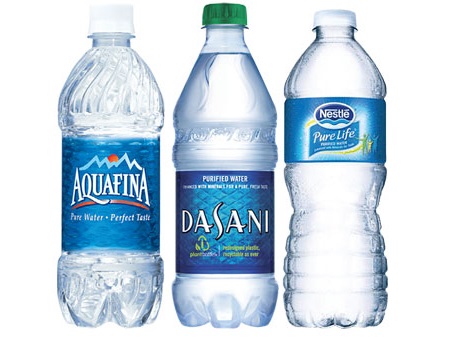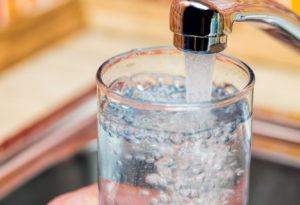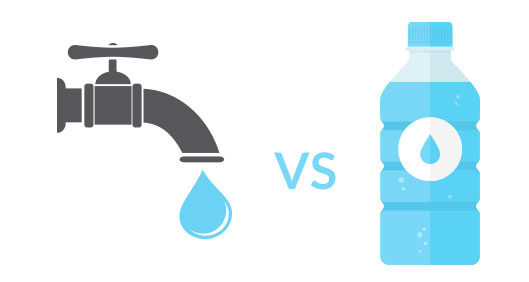Bottled Water vs Tap Water? Which Is Better?
For years, people have been wondering whether or not bottled water is really better than tap water.
For a long time, many people would get water from their tap supplies.
But, nowadays bottled water is everywhere and more people are drinking it than ever before. It’s the second most purchased beverage in the U.S. and the average person drinks 21 gallons of it per year!
Tap water has come under fire for contaminants in water supplies in places like Flint, Michigan. Could tap water bring poor health?
This guide will tell you the truth tap water and how it compares to bottled water.
Bottled Water Comes In Many Varieties

Bottled water is treated by the Food Inspection Agency as if it were food. This secures that there’s no misleading labeling or advertising about the product.
FDA studies have shown that there’s no scientific evidence that bottled water is healthier than tap water. But, in some towns, it may actually be the safest because it guarantees the water source.
Some people prefer bottled water because of the taste. Some companies use flavoring agents. However, it’s important to take note of the ingredients because some of these products may include sugar and calories.
Some bottled water is healthier because of its added nutrients. These bottles contain electrolytes as well as vitamins B and E. These ingredients help your body to replenish your electrolytes after exercise and can stabilize blood glucose levels.
The FDA has discerned that in terms of detecting contaminants, the process isn’t that different from the EPA’s regulation of tap water. However, with bottled water, you’re at least guaranteed that the water is coming from a safe source.
A Questionable Source for Tap Water
Mistreated tap water can hurt your health and even be deadly.
T ap water comes from the city property and through the home owner’s pipes. Problems arise when the water source has been negatively impacted by a natural disaster, aging pipes, maltreatment, or even chemical spill.
ap water comes from the city property and through the home owner’s pipes. Problems arise when the water source has been negatively impacted by a natural disaster, aging pipes, maltreatment, or even chemical spill.
In the 1980s the W.R. Grace & Company was found guilty of improper toxic waste disposal in Woburn, Massachusetts. Trichloroethylene was found in the tap water supply causing seven kids to die from leukemia, others got seriously sick, and one spouse died from acute myelocytic leukemia. Even years later, there are still thousands of polluted sites haven’t yet been cleaned.
The widely known case in recent years is Flint Michigan. In 2001 the Flint River was ordered by the state to be cleaned, however, the Department of Environmental Quality wasn’t treating it with a federally approved anti-corrosive agent. This led to the water’s quality becoming even worse than in the past.
Lead was found in the Flint River and it soon leached into the town’s water supply. Lead is known to cause impaired cognition, behavior disorders, hearing problems, and delayed puberty in children. It has also resulted in reduced fetal growth in pregnant women as well as heart, kidney, and nerve problems.
Medication exists that can reduce the amount of lead in the blood. But there’s still no medicine that can stop its adverse health effects.
After Katrina, it was discovered that a lot of tap water in New Orleans wasn’t drinkable. Broken pipes, sewage, dead bodies, household chemicals and more infected the water supply.
The EPA found that the water had high and dangerous levels of E. Coli as well as lead and other dangerous bacteria. E. Coli is known to cause kidney failure, urinary tract infection, and in some cases death.
Although the EPA tests the water, some contaminates still get through. Agencies are increasingly finding new contaminates such as pesticides, pharmaceuticals, herbicides, and endocrine disrupting compounds. The rise in contaminates has made cleaning the tap source more expensive.
Bottled Water Benefits
- Bottled water is the most convenient source for water on the market. Not only is it 100% portable, but it also has a long shelf life.
- Bottled water is filtered and comes from a guaranteed source. This makes it an essential to have in case of natural disasters that may poison the water supply.
- The packaging is FDA regulated and is 100% recyclable. This way you can make sure you’re always staying green and environmentally friendly.
- It’s wise for you to stock up on water though, so when you buy bottled water make sure you buy in bulk. This will also save you on the price for bottled water.
- Studies have shown that bottles are generally safe, but only when kept under the right temperatures. This makes it essential that you properly treat bottled water.
- It’s important to keep the water bottles out of hot or warm conditions for too long. Bottles shouldn’t be stored in the garage or near gas fumes either.
The Downsides of Bottled Water
- Poor temperatures can lead to risks involving polyethylene terephthalate and Bisphenol A (BPA) that are otherwise avoidable.
- Most plastic bottles are made out of polyethylene terephthalate. This substance if the bottles aren’t treated right can cause dizziness, depression, nausea, and vomiting.
- BPA has also been found in bottles. This chemical element can cause brain and behavioral problems in fetuses and kids. It can also weaken your immune problem and hurt a woman’s reproduction system.
This is why it’s always smart to take care of your water needs the smart way. A company that continuously services your bottled water can ensure that these problems don’t occur. This will ensure you and your company continue drinking the best water available without the associated risk.
Bottled Water of Tap Water, Which Should You Use?
Unfortunately, in places like Woburn and Flint, the residents didn’t find out about the disastrous effects of tap water until it was too late. This is often the case, residents only start to hear about the dangers their water source brings after the fact. And by then, they or their family may already be contaminated.
Although bottled water also has risks, these risks are easily manageable with proper care. This makes bottled water the safest option on the market today!
Now that you know the differences between tap and bottled water, it’s time to get some.
For the healthiest bottled water service on the market, contact us and get your quote today.


